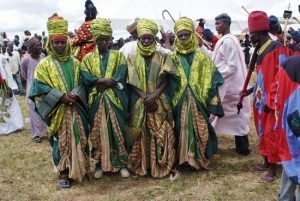10 Interesting Things About the Hausa Tribe
One of the main diversifying feature of Nigeria is the fact that the country is dominated by so many different ethnic groups and tribes. I bet you don’t know that there are at least 350 tribes in Nigeria.
Three major ethnic groups dominate Nigeria. These ethnic groups are so large that they amount for over 70% of the entire ethnic groups in the country -I’m guessing you already know which three ethnic groups I’m referring to.
In this piece we are going to discuss some fascinating things about a tribe that falls into one of the major three ethnic groups in Nigeria. That tribe is none other than the Hausa tribe. I’m going to base my discussion on 10 interesting things about the Hausa tribe.
Get in here if you want to know more about this great Nigerian tribe.
#1 Rich cultural heritage
Of the 10 interesting things about the Hausa tribe, their rich cultural heritage comes first. The culture of the Hausa tribe is their most unique feature. Their culture defines everything about them. A short stay with Hausa natives will give you a hint of what I’m talking about here. From their greeting style, to their food, the way they farm etc. everything comes together to make up an interesting Nigerian tribe.
The Hausa tribe have many interesting cultural and traditional practices that defines them, some of which includes: Koko (wrestling) ceremonies, hunting expeditions, farming rituals. binge drinking, -the title of Sarki’n Arna is given to the best binge drinker in an Hausa community as well as numerous other traditional practices.
#2 Wide variety of dishes
If you’ve ever been to northern Nigeria, you must have noticed the wide variety of dishes which are being offered by the Hausa people. I lost count of the number of dishes that were available to me during my stay in the North. Meals such as Tuwo Shinkafa -foo-foo made from rice, which can be eaten with any soup one which is Miyan kuka -made from baobab leaves and dried okra, or other soup variety such as kaka or tause.
My special treat of the Hausa diet are the wide variety of locally made snacks which are highly rich in nutrients. ‘Awara’, made from soybeans curds, Masa, ‘a type of cake’ made from rice, Kilishi made from grilled cow-meat, Fura da Nono (local yoghurt), made from fresh cow milk, and Kosai, made from bean cake are some of my favorites, although there are hundreds more which I simply didn’t mention.
The wide variety of locally made dishes which are highly nutritious is something that makes the Hausa tribe quite fascinating.
#3 Dressing

It is interesting to see to how people from the Hausa tribe dress. Like I said, I’ve stayed with the Hausa people for a long time and I have a good understanding of how they live, eat and dress. The men usually dress in long flowing gowns many of which are known as ‘Jalabiya’, or ‘Baban-riga’ etc, with a round cap to match.
The women from the Hausa tribe usually dress in a manner that conceals almost every part of their body, this is largely due to their strong religious beliefs. Dresses such as matching Ankara blouses, wrapper and head-tie, embroidered gowns etc. are usually worn with the Islamic ‘Hijab’ or just a veil or shawl.
#4 The Hausa language
The language spoken by the Hausa tribe is the Hausa language. The interesting thing about the Hausa language is its high popularity. The Hausa language is the most widely spoken language in West Africa, there are more than 36 million people who speak the Hausa language as their first language and millions others who have learnt to speak the language as a second language.
The Hausa language is not just spoken by Nigerians in Nigeria alone; countries such as Chad, Sudan, Cameroon, and some parts of Ivory Coast also speak the Hausa language as either their first or second native language. The Hausa language is perhaps the easiest language to learn in Nigeria, which explains the vast number of second-language speakers of the language.
#5 Farming
The Hausa people are also known to be great farmers. In Nigeria alone, no other Nigerian tribe has more farmers than the Hausa tribe. Every Nigerian grown food crop is vastly produced by the Hausa tribe. The Hausa tribe have been able to use the large expanse of land available to them to churn out enough food to feed a large chunk of the Nation’s population. It is quite interesting to see how Hausa farmers who are barely literate, produce tons of food crops for the Nations populace; imagine what they could achieve with proper government funding and support.
#6 Hausa folklore
It’s always interesting to dig into the Hausa folklore and take a look at their interesting legends one more time. The legend has it that, the Hausa tribe was formed when a Bayajidda of Baghdad had a quarrel with his father he then migrated to Daura (present day northern Nigeria) some time between the 9th or 10th century AD. It was in Daura where he met the king if Daura, Bayajida helped the Daura king slay a dangerous snake which was preventing the people from fetching water. As a reward, the Queen of Daura offered her hand in marriage to Bayajida.
It was Bayajidda’s son, Bawo, who then founded the city of Biram; named after Bawo’s first son. Biram had six sons who went on to become six Hausa city states collectively known as Hausa bokwai, meaning Hausa seven. The Hausa tribe evolved thence.
#7 Low cost of marriage

Over 90% of the Hausa tribe are Muslims, hence, most Hausa traditional marriages are based on Islamic rites. Aside from this fact the Hausa tradition does not believe in charging exorbitant bride prices from suitors, unlike is the norm for many; you can check out the Top 10 most expensive bride price in Nigeria (insert link to your article on bride prices in Nigeria) and see how much some Nigerian tribes are willing to charge as bride price.
The ‘Sadaki’ which means payment of dowry, does not require extravagant spending from the suitors. This is because the Hausa tribe believes that lower bride prices attracts more blessings for the bride and her marriage. Marriage celebrations usually last up to a week in some cases.
#8 Affinity for horses
One of the interesting things about the Hausa tribe is their undying love for horses. This is partly due to the fact that the Hausa tribe is mainly dominated by Muslims. During any Islamic Holiday (durbar), Hausa people are seen parading beautiful and healthy horses which they ride in so much elegance.
No tribe in Nigeria comes close to the Hausa in terms of possession of horses. Some of these horses are imported from Argentina, Brazil and Spain.
#9 Hospitality
The Hausa tribe are known to be the most hospitable tribe in Nigeria. The scourge of insurgency in a few states of northern Nigeria has cast a dye on this fact, however, this still remains true. Hausa people are hospitable and would readily accommodate strangers unlike other tribes in Nigeria. It is quite easy to make and maintain long lasting friendships with someone from the Hausa tribe; I know this for a fact because I’ve made many.
The topic of hospitality in Nigeria always makes for an interesting debate due to our suspicious nature. However, the Hausa tribe interestingly are more hospitable than most; you can find out for yourself.
#10 Love for exotic cars

Okay, I know a lot of you guys (our beloved readers) might question this inclusion on the list, but I’m adding it based on two reasons. Firstly, I’ve lived with the Hausa tribe for a long time and I have an experience of what I’m saying. Secondly, I would like to end this piece on a humorous perspective.
A lot of men (women too) from the Hausa tribe have an insatiable craving for owning the most exotic cars money can buy. They are ready to travel overseas just in a bid to import the latest cars from around the world to the country. I’m not saying other Nigerian tribes do not love cars; but people from the Hausa tribe take the lead. To many, these cars come first before any landed property or interior decorations of their houses. Isn’t that interesting?
So why do the Hausa tribe love exotic cars so much? ‘Abeg if you find out, make you try tell me’.
What did I leave out? If there’s anything more interesting about the Hausa tribe I should’ve mentioned, kindly educate me in the comments section, I’ll be checking.
